It took 2 1/2 years, but the Philadelphia Spectrum, filled with history from the Broad Street Bullies to Dr. J to The Grateful Dead, has finally been reduced to a pile of rubble.
The Spectrum was the original hub for what is now sports company Comcast-Spectacor, whose roots go back 45 years. Now that the arena is gone — after multiple farewell games and concerts and about three months of actual demolition work — the site is being cleared for the next chapter in the Comcast-Spectacor story, a massive, 50,000-square-foot sports bar that will be the first piece of the Philly Live retail, dining and entertainment complex.
The building’s slow demise stands in contrast to Comcast-Spectacor’s quiet, steady ascent. The organization has long been a sports power in its home city, where it owns the Flyers, the 76ers and Wells Fargo Center, but in recent years it has extended its reach beyond Philadelphia through its five stand-alone firms tied to the facilities industry. It now touches virtually every aspect of the sports business.
“There is no company like it with respect to the combination of their base operation in Philadelphia and the expansion of that to arenas throughout the country, together with ticketing, food services and the like,” NBA Commissioner David Stern said.
James Robinson, managing director of Greater Philadelphia sports marketing agency Alliance Marketing Partners, who in his 25-year career has negotiated and activated $200 million in sponsorship and licensing deals, called Comcast-Spectacor “the most powerful company in sports, when you look at their total assets and the broadcasting power of Comcast.”
“But I think it is also a company largely misunderstood,” he said. “People don’t realize how multifaceted they really are.”
Comcast-Spectacor was formed in 1996 when Ed Snider sold 66 percent of Spectacor sports holdings to Philadelphia-based cable broadcaster Comcast but retained control of the operation as chairman. Since then it has grown through a series of acquisitions and startups tied to two common themes — an entrepreneurial spirit and the rock-solid relationships its key executives have developed over four decades.
Snider’s philosophy is simple, and it’s one that is echoed by every department head. “You hire good people, let them do their jobs and that’s how you really grow,” said Peter Luukko, Comcast-Spectacor’s president and chief operating officer, chairman of Global Spectrum and president of the Flyers.
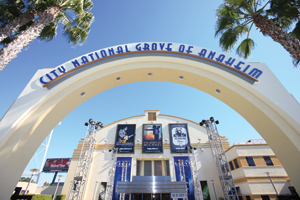 |
ROBERT MORA
Comcast-Spectacor’s deals now extend outside of Philadelphia and sports, like the naming-rights deal that Front Row Marketing Services did for this concert venue in Anaheim. |
Together, Snider and Luukko have built a versatile group of companies that manage buildings, sell sponsorships and premium seats, track media exposure, operate ticketing systems and sell food and merchandise. It started with Global Spectrum in 2000, followed in succession by Ovations Food Services, Front Row Marketing Services, New Era Tickets/FanOne Marketing and Paciolan.
All told, Comcast-Spectacor’s business generates more than $4.5 billion annually in gross revenue, a figure that covers Flyers and Sixers income and operations at Wells Fargo Center. The number also reflects the total sales produced at every venue where Comcast-Spectacor’s facility services firms operate. It also includes all the money generated from every ticket, concession, sign, suite and club seat sold, plus the marketing of technologies supporting those systems.
What can’t be determined is how much revenue Comcast-Spectacor takes home at the close of business each day. The company is privately held, and its officials would not share net revenue figures.
Still, the top-line numbers show the depth of Comcast-Spectacor. In 11 years, Global Spectrum, its building management division, has become the industry’s second-largest facility operator behind SMG — a company that Snider helped create and then sold — with 97 accounts generating about $590 million annually in gross sales. In concessions, Ovations has grown from generating $5 million in 2000 to more than $200 million annually. Front Row’s premium seat and sponsorship sales generate $35 million a year, compared with $1.5 million when Comcast-Spectacor bought it 10 years ago.
Ticketing technology firm Paciolan, now wholly owned by Comcast-Spectacor, sells more than 100 million tickets every year through its deals with college arenas and stadiums, major and minor league sports facilities and other venues. With an average ticket price of $35, industry sources estimate Paciolan’s 501 accounts generate at least $3.5 billion in annual sales.
Separately, New Era’s deals with 35 buildings generate $18 million in annual ticket sales.
• • •
Those gross numbers have grown the past decade because of Comcast-Spectacor’s ability on the facilities side to make smart decisions without overextending itself.
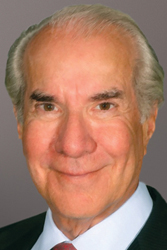 |
| Snider |
“We’re a nickel-and-dime business,” Snider said. “We slowly build our companies in what I like to believe is a very solid way, not with a whole lot of flash, and frankly, not with a whole lot of cash. We’re not risk takers in that way. But we add [accounts] every year, and it adds up.”
What Comcast-Spectacor has accomplished is far more difficult than it looks, said Rich Krezwick, president of Devils Arena Entertainment at Prudential Center in Newark. Krezwick, a Philly native, got his start in the industry as the Spectrum’s bookkeeper in 1979 and said he “grew up together” with Luukko when both worked for SMG in the 1980s.
Comcast-Spectacor essentially “grew organically from nothing, and it sounds easy that you take it slow and operate with a steady hand, but none of that is easy,” Krezwick said. “It’s hard not to be impulsive in this business — it’s entertainment, you’re supposed to have a high pulse rate. But Ed Snider and [Luukko] have a steady approach to success that has worked time and time again. I love the complexion of the company and I love the culture that Peter has created.”
It is a culture where the five firms feed off of one another. Individually, they compete for deals in their respective disciplines, but depending on the public bid process and market needs, they team up on proposals to grow business together. In a few instances, all four lines of business — facility management, concessions, ticketing and marketing — converge within the same four walls.
| 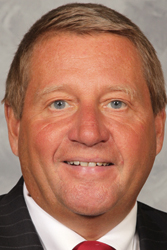
| Luukko |
“If you look at our model, our perfect situation is obviously where we get the building management, food, ticketing and marketing deals,” Luukko said. “In this way, a market that maybe we made $250,000 in, maybe we’re pulling out over a million dollars now between the companies by going in and doing a really good job and being rewarded through providing all these services.”
But that is not always the case. When a facility isn’t hungry for the whole menu, Comcast-Spectacor is happy to let it order a la carte.
“The key for us is there are also many situations where they just want arena management and already have an existing ticketing agreement or food service agreement, and that’s fine,” Luukko said. “The idea is you provide services together where you can, and separately when it doesn’t make sense, so there’s no pressure to do it all. We don’t jam ourselves in, we compete. We have competed in our own [Global Spectrum-run] facilities on food and ticketing.”
In situations where just one Comcast-Spectacor entity operates in a building, it can make suggestions for bringing its sister firms into the market to help improve the bottom line. That’s what happened at AutoZone Park in Memphis, where Ovations has run concessions since the Class AAA ballpark opened in 2000. Two years ago, Ovations President Ken Young gave Global Spectrum the heads-up when the nonprofit group that owns the team and controls the stadium required a third-party firm to run the facility after defaulting on its payments to the park’s bondholders.
“Ovations told Global there was an opportunity and that they ought to look at it,” said John Pontius, treasurer for the Memphis Redbirds Foundation. “Global found us and one thing led to another.”
Young says he knows his company will sell more hot dogs and beer at a sports facility operated by Global Spectrum.
Young, with 39 years in the concessions business, recognizes the importance of arenas and stadiums filling the gaps between games with concerts, family shows and other events to help keep those buildings in the black.
For Ovations, 25 percent of its gross revenue is tied to Global-managed facilities, mostly in secondary markets and at its seven college accounts. The rest of Ovations’ business is independent of its sister company.
“The thing that appeals to me most having Global with us [is] I can usually count on that the events are going to be there,” Young said.
“Without [upsetting] my college clients, so often they don’t worry about booking the building,” he said. “We realize that basketball, whether it’s men’s or women’s, has first right, but if Global’s going into a building, they are going to try to maximize its use. I feel real good about my [income] projections when you have somebody like that operating the facility. They just don’t want to be a caretaker.”
Having a fellow Comcast-Spectacor unit in the building can open doors, but it doesn’t seal deals. Front Row, for example, did not win deals to sell advertising and premium seats at Cleveland State University’s Wolstein Center and Comcast Arena at Everett (Wash.), two venues where Global was selected as the operator, said Dick Sherwood, Front Row Marketing’s founder and president.
• • •
Comcast-Spectacor’s origins date to 1966, the year Snider and Jerry Wolman founded the Flyers and formed Spectrum Arena Inc. to build a new arena. Wolman had also owned the Philadelphia Eagles and originally hired Snider as the NFL club’s treasurer and executive vice president. Their hockey partnership did not last long — news that the two had split over Wolman’s financial woes hit the papers on the same day in October 1967 as the Flyers’ first regular-season home game. Snider took over the Flyers and Wolman took over the Spectrum. In May 1968, six months later, Wolman was forced to put the arena under Chapter 11 bankruptcy protection. Snider then bought the Spectrum, also the Sixers’ home, out of bankruptcy in 1972.
 |
COMCAST-SPECTACOR
The Spectrum is history, but only after the company saluted it with a string of ceremonies and farewell games. |
An exclusive deal with local promoter Electric Factory Concerts kept the Spectrum thriving apart from Wolman’s troubles.
“Our building became very successful with two teams, all these concerts and all the other events, and people [from other teams] kept coming to visit us to say, ‘Well, how do you do this, how do you do that?’” Snider said. “Finally it occurred to me, we are giving all this information away for free, why don’t we own a management business? At that point I started Spectacor Management … the successor of all this is SMG, which we started.”
In 1977, separate from the Flyers and the Spectrum, Snider formed SMG with partners Aramark and the Pritzker family, owners of the Hyatt hotel chain. SMG, a pioneer in the business of privately managing public facilities, grew over the years to a firm that now operates about 200 buildings worldwide. Luukko started at SMG in 1985 and soon became general manager of the Los Angeles Memorial Coliseum and Sports Arena and vice president of the company’s Western region.
Eight years later, Snider turned to Luukko to become president of the Spectrum and expand Snider’s holdings apart from his investment in SMG. “Ed came to me and said, ‘I can tell you’re an entrepreneur and I need you to be one’ … which was great advice,” Luukko said.
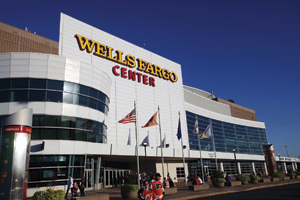 |
LEN REDKOLES
Construction of CoreStates Center, now Wells Fargo Center, started in 1994 and it opened in 1996. |
Snider told Luukko he could still be “the best arena guy around and pay attention to every single detail and make every decision, but he should let his own people grow and make their own decisions.” Snider needed Luukko, a Boston native, to move back East and focus on developing a new arena to replace the Spectrum. Construction of CoreStates Center, now Wells Fargo Center, started in 1994 and it opened in 1996, the same year Snider sold two-thirds of his holdings to Comcast. As Snider and Spectacor were in negotiations with Comcast, a third party presented an opportunity for the joint venture to also buy the Sixers from Harold Katz, which they pursued. The purchase was completed and the joint venture was launched.
The terms of the merger had Comcast headquarters in downtown Philadelphia taking financial control of Comcast-Spectacor with Snider’s group at the sports complex maintaining total control of the operation.
Together, they also launched Comcast SportsNet with some of the same television executives that founded Snider’s old Prism, one of the country’s first pay-per-view sports channels in the 1980s.
In 1997, with his plate full in Philadelphia, Snider parted ways with SMG. Comcast-Spectacor sold its one-third share back to SMG and signed a two-year noncompete clause that prohibited it from bidding against its former partners for building management deals.
Nobody except maybe Luukko thought they would get end up back in the game of operating arenas and stadiums outside Philadelphia.
“We had our hands full taking on the Sixers and building the arena, and we had two arenas to book and the new sports network,” Luukko said. “Once we got our hands around all that, with the teams heading in the right direction and the network doing well, we figured our growth was limited in Philly. Owning two pro teams in one city is enough [and] we certainly knew building management back from the Spectrum and SMG.”
In January 2000, soon after its noncompete expired, Comcast-Spectacor announced it had formed Global Spectrum after acquiring a small facility management firm, Globe Facility Services. Globe’s co-founder, Mich Sauers, knew Snider and Luukko from his days working at the Spectrum and SMG and had called up Luukko one day after Globe signed a deal to run a new arena in Trenton, N.J., not far from Philadelphia. Their conversation steered toward joining forces to develop a larger company to compete against SMG and other firms.
Comcast-Spectacor’s resources, talent and knowledge of the industry were keys to making the deal. “All those things made it an easy decision for me,” Sauers said.
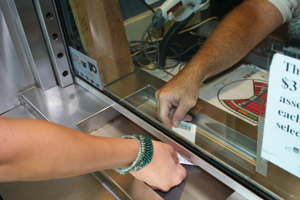 |
NEW ERA TICKETS
Comcast-Spectacor launched New Era Tickets to compete more fully in the market.
|
That was just the beginning. Over the next four years, Comcast-Spectacor bought two small food service companies to form Ovations, purchased Front Row Marketing and launched New Era Tickets. In 2006, as the Internet grew and database marketing became a key part of team business, Comcast-Spectacor launched FanOne Marketing, a CRM services provider, and folded that piece of the business into New Era.
“We thought it would be important for us to make these companies self-sufficient so they would have the latitude to pursue situations individually,” Luukko said. “What you’re doing is creating more value with four separate companies as opposed to one.”
• • •
Ticketing was key, Luukko said. Eight to 10 years ago, the advent of selling tickets over the Internet made it more cost effective to invest in the infrastructure required to run a ticketing system. Most important, Comcast-Spectacor officials had difficulty accessing Flyers and Sixers customer data kept by Ticketmaster. It was that “disconnect” between the two parties over who controls that valuable information that ultimately drove the decision to form New Era, Luukko said.
The addition of Paciolan increased business exponentially for Comcast-Spectacor. It had bought a minority share in Paciolan in 2003, the same year it launched New Era Tickets. Five years later, Paciolan sold its business to Ticketmaster. Comcast-Spectacor maintained its interest in Paciolan, creating an odd pairing with two ticket firms becoming co-owners of a third competitor.
That changed in dramatic fashion in January 2010. Comcast-Spectacor gained full ownership of Paciolan after Ticketmaster was forced to relinquish its primary share under terms the Department of Justice set up to approve the Ticketmaster-Live Nation merger.
The federal government’s decision provided a windfall for Comcast-Spectacor, considering Paciolan’s dominance in the major college market. Of Paciolan’s 104 college deals, all are Division I level in basketball and 71 are Football Bowl Subdivision programs. Paciolan and New Era combine to sell more than 200 million tickets a year, positioning Comcast-Spectacor’s two subsidiaries as the sports industry’s second-largest ticketing providers behind Ticketmaster.
For Paciolan, whose business model gives teams and facilities the freedom to brand their in-house ticketing systems using Paciolan’s technology, moving to Comcast-Spectacor has resulted in greater client retention, said Dave Butler, Paciolan’s president and CEO. When Ticketmaster owned Paciolan, its strategy was to move Paciolan clients over to Ticketmaster’s core platforms, Butler said.
“One of the beauties of Comcast-Spectacor is that each of the entities gets to operate as an entrepreneurial business and not lose that market focus that has made us all successful, yet we all get to leverage the strength of [corporate] overall,” he said. “Candidly, the proof of the pudding is in how well things are going for us under the Comcast-Spectacor umbrella. We have brought in three new clients in the last two months and renewed 40 clients in the last 11 months. I think it’s the best of both worlds.”
Philadelphia Union officials would agree. The MLS club spoke with other operators before hiring Global Spectrum, Ovations and New Era Tickets. Officials assured the Union their new stadium would rank second to none for delivering a world-class experience, said Nick Sakiewicz, the team’s CEO.
“Our fan surveys were off the charts in terms of customer satisfaction,” he said. “They knocked it out of the park.”
Sakiewicz, a former AEG executive, would not identify who else the Union spoke to about running PPL Park. Presumably, those talks included AEG, a company whose owner, Phil Anschutz, was a founding investor in MLS. On its own, AEG Facilities has grown quickly in its first three years of operation by leveraging AEG Live, its event promotions division, to guarantee concert dates in return for big league arena booking and marketing deals. In other cities, AEG invests millions in exchange for contracts extending beyond the normal five to 10 years.
The business models for Global Spectrum, SMG and AEG Facilities vary widely, making room in the industry for all three companies, said Krezwick, who was formerly with AEG Facilities’ East Coast operation. Global and SMG for the most part focus on secondary markets.
“AEG is a content-producing company with terrific marketing and sales capabilities,” Krezwick said. “On the SMG side, you have a very good operator with a long history. In the middle, you have a very good realistic choice in Global Spectrum that offers a lot of what both companies offer and an all-in-one solution by offering food, ticketing and management services.”
• • •
What does the future hold for Comcast-Spectacor? In Philadelphia, more upgrades to Wells Fargo Center. Brisbin Brook Beynon, the Toronto architect designing Madison Square Garden’s $800 million renovation, is studying a reconfiguration to the Philly arena’s club seats and new standing-room areas in the corners of the upper deck supported by trendy bars and concessions stands. There is no timetable for when those improvements will begin, Luukko said.
Elsewhere, Global Spectrum, Ovations, New Era and Front Row continue to develop new business. Global has a signed three-year contract to manage and book events at Southern Cal’s Galen Center, a few miles down Figueroa Street from AEG’s Staples Center. The school was Paciolan’s first account 30 years ago, and those longtime ties, coupled with inroads made by John Page, Global Spectrum’s chief operating officer and a former USC offensive tackle, helped secure that deal, Butler said.
Internationally, Global Spectrum is working with business partners to develop new arenas in France and China that it will operate, Sauers said. In Scottsdale, Ariz., Ovations is in the first few weeks of operating food and retail concessions for a new spring training ballpark shared by the Arizona Diamondbacks and Colorado Rockies. Paciolan continues to renew its college deals, the latest one at the University of Kansas, an extension announced in mid-February.
To expand further, Luukko said, Comcast-Spectacor could return to minor league hockey, a space it left when it sold the American Hockey League’s Philadelphia Phantoms in 2009. The club, the Flyers’ top affiliate, played most home games at the Spectrum before relocating to the Glens Falls (N.Y.) Civic Center.
The United States Hockey League, a junior amateur league in the Midwest, is one possibility, Luukko said. His son Nick plays for the USHL’s team in Dubuque, Iowa, where his father travels to see him in action.
“We think that’s a great product and is only going to grow,” Luukko said.
Comcast-Spectacor may also dive further into technology beyond what FanOne Marketing now provides teams with its CRM platforms, maybe working with Comcast itself to develop new applications for mobile devices to improve their interaction with fans, Luukko said.
Whatever it is, Comcast-Spectacor will continue its methodical approach to build all lines of business for the long term, with Luukko most likely taking over for Snider as Comcast-Spectacor’s CEO after the 78-year-old boss announces his retirement. Snider has yet to say when he will step down, but when the time comes he plans to recommend that Luukko take the reins (Comcast officials will make the final decision). With that, the culture of independence they both developed for success in the sports facilities industry would continue uninterrupted.
“We’re not an organization that rolls up businesses through acquisitions only to look for an exit strategy,” Luukko said. “We’ve become a very big company, but we still have that entrepreneurial spirit of a great mom-and-pop business.”










